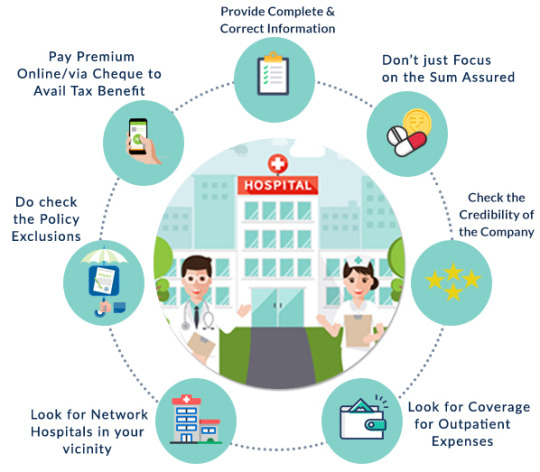#healthinsurancecoverage
Explore tagged Tumblr posts
Text
Get the Best of Health Insurance with Niva Bupa’s Smart Plans

Niva Bupa Health Insurance provides a wide range of benefits designed to keep you covered, whether it's hospitalization, pre-and post-hospitalization expenses, or access to cashless treatment. Explore the features and advantages that make Niva Bupa a trusted name in health insurance, offering peace of mind for individuals and families.
#NivaBupaHealthInsurance#HealthInsuranceBenefits#NivaBupaPlans#CashlessTreatment#HealthInsuranceCoverage#MedicalInsuranceIndia
0 notes
Text
How to Choose the Best Private Medical Insurance

"Health is a crown that the healthy wear but only the sick can see." - Imam Shafi'i When it comes to safeguarding your health, having the right private medical insurance is essential. With the rising costs of healthcare, it's crucial to ensure that you have adequate health insurance coverage that meets your specific needs. Whether you're considering an individual health plan or exploring options for your family, understanding the factors to consider when choosing the best private medical insurance is paramount. In this article, we will guide you through the process of selecting the right private medical insurance for your needs. We will explore the different types of plans available, the importance of assessing your health insurance needs, and how to compare different options. Additionally, we will provide tips on researching insurance providers, understanding insurance terminology, and navigating the application process. By the end of this article, you will have the knowledge and tools necessary to make an informed decision when it comes to private medical insurance. Protecting your health is a vital investment, and with the right coverage, you can have peace of mind knowing that you have access to quality healthcare. Key Takeaways: - Choosing the best private medical insurance is crucial for safeguarding your health. - Assess your health insurance needs based on factors like your current health status, budget, and coverage preferences. - Understand the different types of private medical insurance plans available, such as individual health plans and family health plans. - Compare plans based on factors like cost, network of providers, customer service, and additional benefits. - Research insurance providers to ensure their reputation, financial stability, and customer satisfaction.
Understanding Private Medical Insurance
In today's ever-changing healthcare landscape, having private medical insurance can provide you with essential coverage and peace of mind. Private medical insurance, also known as a healthcare plan or private healthcare policy, offers numerous advantages over other types of insurance. Let's explore what private medical insurance is and why it's a valuable investment for you and your family. What is Private Medical Insurance? Private medical insurance is a type of health insurance coverage that allows individuals to access private healthcare services and facilities. Unlike public healthcare systems, private medical insurance offers benefits such as shorter waiting times for consultations, access to specialists, and a wider range of treatment options. How Private Medical Insurance Differs Private medical insurance differs from other types of insurance, such as life or car insurance, in that it specifically focuses on providing coverage for medical expenses. While other insurance types may offer some degree of healthcare coverage, private medical insurance is designed to cater specifically to your healthcare needs. It ensures that you receive the medical attention you need when you need it, without relying solely on public healthcare resources. The Benefits of having Private Medical Insurance Having a private medical policy offers several advantages that can greatly benefit you and your family. Some of these advantages include: - Quick access to healthcare: With private medical insurance, you can avoid long waiting times for appointments and treatments. - Choice and flexibility: Private medical insurance allows you to choose your preferred healthcare providers and specialists. - Comprehensive coverage: Private medical insurance provides coverage for a wide range of medical services, including consultations, surgeries, hospital stays, and specialized treatments. - Personalized care: Private medical insurance allows you to receive personalized medical attention tailored to your specific needs and preferences. - Peace of mind: Knowing that you have private medical insurance can provide financial security and peace of mind, especially during unexpected health crises.
Assessing Your Health Insurance Needs
When it comes to choosing the right private medical insurance plan for yourself, it's essential to assess your specific health insurance needs. Evaluating factors such as your current health status, budget, and coverage preferences will help you make an informed decision that aligns with your requirements and ensures adequate protection. First, consider your current health status. Take into account any pre-existing conditions or ongoing medical treatments that require coverage. If you have a chronic illness or require specialized care, you may prioritize a private medical insurance plan that offers comprehensive coverage for these specific needs. Next, evaluate your budget. Determine how much you can comfortably allocate toward health insurance coverage. It's important to strike a balance between affordability and comprehensive coverage. Consider factors such as monthly premiums, deductibles, and co-payments when assessing different private medical insurance plans. Assessing Your Health Insurance Needs: - Evaluate your current health status and any specific medical needs. - Determine your budget and financial capabilities. - Consider your coverage preferences and priorities. Lastly, carefully consider your coverage preferences. Are you looking for a private medical insurance plan that covers a broad range of healthcare services, including hospital stays, doctor visits, and prescription drugs? Or do you have specific coverage priorities, such as maternity care or mental health services? Identifying your coverage preferences will help you narrow down the options and choose a plan that meets your unique needs. Remember, private medical insurance plans can vary in coverage options, cost, and additional benefits offered. By assessing your health insurance needs, you can ensure that you select a plan that provides the right level of coverage and aligns with your budgetary constraints. By assessing your health insurance needs, you'll have a clear understanding of the coverage and benefits you require. This evaluation will serve as a valuable guide when comparing and selecting a private medical insurance plan that offers the most suitable coverage for you.
Types of Private Medical Insurance Plans
When it comes to private medical insurance, there are various options available to meet your specific needs. Understanding the different types of plans can help you make an informed decision. Let's take a closer look at the three main types of private medical insurance plans: individual health plans, family health plans, and group health plans. 1. Individual Health Plans An individual health plan is designed to provide coverage for an individual person. Whether you are self-employed, unemployed, or do not have access to employer-sponsored coverage, an individual health plan can offer you the protection and benefits you need. These plans can be customized to meet your specific healthcare requirements and budget. 2. Family Health Plans Family health plans are designed to provide coverage for your entire family. Whether you have a spouse, children, or dependents, these plans ensure that all members of your family have access to quality healthcare. Family health plans often offer comprehensive coverage and can be a cost-effective option for families compared to individual plans for each family member. 3. Group Health Plans Group health plans are typically offered by employers or organizations to provide coverage for a group of individuals, such as employees or members of an association. These plans often provide a range of benefits and may offer more affordable premiums due to the collective purchasing power of the group. Group health plans can also have additional features like wellness programs and preventive care services. Now that you are familiar with the different types of private medical insurance plans, it's important to compare different options to find the one that best suits your needs. You may want to consider factors like coverage benefits, premiums, network of healthcare providers, and any additional perks or features offered. To help you in this process, let's compare the key features of individual health plans, family health plans, and group health plans in the table below: Insurance PlanCoverage BenefitsPremiumsNetwork of Healthcare ProvidersAdditional FeaturesIndividual Health PlansCustomized coverage for individualsVaries based on individual factorsAccess to a wide network of providersOptions for personalized careFamily Health PlansComprehensive coverage for the entire familyVaries based on family size and compositionAccess to a wide network of providersDependent coverage and family-focused benefitsGroup Health PlansCoverage for groups of individualsShared between employer and employees/membersAccess to a network of providers specific to the groupCollective bargaining power and additional benefits for the group Comparing the features of different private medical insurance plans can help you determine which one aligns with your healthcare needs and financial situation. Take the time to research and evaluate your options to find the plan that offers the best value for you and your family.
Understanding Health Insurance Coverage
When it comes to selecting the right private medical insurance plan, understanding health insurance coverage is essential. By exploring the various aspects of coverage options, you can make an informed decision that aligns with your specific needs. Hospitalization One crucial aspect of health insurance coverage is hospitalization. A comprehensive private medical insurance plan will provide coverage for hospital stays, including room charges, surgical procedures, and specialist consultations. Doctor Visits Another important element of health insurance coverage is doctor visits. Whether you need regular check-ups or have a specific medical condition, a good private medical insurance plan will include coverage for consultations with doctors, specialists, and other healthcare professionals. Prescription Drugs Prescription drugs can often be a significant expense. To ensure adequate medical coverage, it is essential to choose a private medical insurance plan that includes coverage for prescription drugs. This will help alleviate the financial burden of necessary medications. Preventive Care Preventive care is an essential part of maintaining your overall health and well-being. Many private medical insurance plans offer coverage for preventive services such as vaccinations, screenings, and wellness visits. This coverage is crucial in catching potential health issues early on and preventing them from becoming more severe. By considering these key aspects of health insurance coverage, you can compare different private medical insurance plans more effectively. It's important to choose a plan that provides comprehensive coverage for hospitalization, doctor visits, prescription drugs, and preventive care to ensure the best possible medical support for you and your family.
Factors to Consider When Comparing Plans
When comparing private medical insurance plans, it's important to keep several factors in mind. By carefully considering these aspects, you can make an informed decision and choose a plan that suits your needs. Here are some key factors to evaluate when comparing health insurance plans: 1. Cost One of the most crucial factors to consider is the cost of the insurance plan. Compare the monthly premiums, deductibles, and out-of-pocket expenses for each plan. Be sure to assess whether the coverage justifies the cost and fits within your budget. 2. Network of Providers Check the network of healthcare providers included in each plan. Ensure that your preferred doctors, specialists, hospitals, and clinics are within the network. Having access to a wide network of providers ensures convenience and quality care. 3. Customer Service The level of customer service offered by the insurance provider is important. Read customer reviews and ratings to gauge how responsive and helpful the insurer's customer service department is. Prompt and efficient customer service can make a significant difference when dealing with claims and any other inquiries. 4. Additional Benefits Many private medical insurance plans offer additional benefits that can enhance your coverage. These benefits may include wellness programs, telemedicine services, maternity coverage, or prescription drug coverage. Assess what additional benefits are included in each plan and determine their value based on your specific needs. "By carefully considering the cost, network of providers, customer service, and additional benefits, you can make an informed decision and choose a private medical insurance plan that meets your needs." It's important to take the time to compare health insurance plans thoroughly. By evaluating these factors, you can ensure that you have the right coverage and peace of mind when it comes to your healthcare needs.
Researching Insurance Providers
When it comes to private medical insurance, it's important to choose a reliable provider that offers the right coverage for your needs. With so many options available, researching different insurance providers is a crucial step in making an informed decision. In this section, we will guide you on how to research insurance providers and evaluate their reputation, financial stability, and customer satisfaction. Evaluating Reputation One way to assess an insurance provider's reputation is by checking online reviews and ratings. Look for feedback from policyholders to gain insights into their experiences with the company. Additionally, consider consulting independent third-party ratings and rankings that evaluate the performance and reliability of insurance providers. Assessing Financial Stability It's important to choose an insurance provider that is financially stable and capable of honoring their commitments. Check the insurer's financial strength ratings from reputable rating agencies such as Standard & Poor's, Moody's, and A.M. Best. These ratings will give you an idea of the company's ability to pay claims and its long-term financial stability. Measuring Customer Satisfaction A satisfied customer base is a good indicator of an insurance provider's reliability and quality of service. Look for customer satisfaction surveys or ratings that measure policyholders' satisfaction levels. You can also inquire about the provider's complaint resolution process and their responsiveness to customer inquiries and concerns. By conducting thorough research and considering factors such as reputation, financial stability, and customer satisfaction, you can gain confidence in your choice of a private medical insurance provider. Now that you have a clear understanding of how to research insurance providers, you can move forward in comparing different options and selecting the best coverage for your needs. Factors to ConsiderPoints to EvaluateReputation- Check online reviews and ratings. - Consult independent third-party ratings and rankings.Financial Stability- Check the insurer's financial strength ratings from reputable rating agencies. - Assess the company's ability to pay claims and financial stability for the long term.Customer Satisfaction- Look for customer satisfaction surveys or ratings. - Inquire about the complaint resolution process and responsiveness to customer inquiries and concerns.
Understanding Insurance Terminology
When navigating the world of private medical insurance, it's essential to familiarize yourself with the terminology commonly used in insurance policies. Understanding these terms will help you make informed decisions about your health insurance coverage. Below, we've compiled a list of key insurance terms you should know: Deductibles The deductible is the amount you must pay out of pocket before your insurance coverage kicks in. For example, if your deductible is $1,000 and you have a medical bill of $2,500, you will need to pay $1,000, and the insurance company will cover the remaining $1,500. Copayments A copayment, or copay, is a fixed amount you must pay for certain medical services. For instance, your insurance policy might require a $20 copayment for each doctor's visit. The remaining cost of the visit will be covered by your insurance provider. Out-of-Pocket Maximums The out-of-pocket maximum is the maximum amount you will have to pay for covered medical services in a given year. Once you reach this limit, your insurance company will cover 100% of the remaining costs. Exclusions Exclusions are specific medical conditions, treatments, or services that are not covered by your insurance policy. It's crucial to review the exclusions section carefully to understand any limitations or restrictions on your coverage. "Understanding insurance terminology is key to making informed decisions about your health coverage." By familiarizing yourself with these insurance terms, you can effectively compare policies, understand the costs involved, and make the right choices for your personal health insurance needs. To further illustrate how these terms impact your coverage, refer to the table below: TermDefinitionImportanceDeductiblesThe amount you pay before insurance coverage beginsUnderstanding deductibles helps you plan for out-of-pocket expenses and budget accordingly.CopaymentsA fixed amount you pay for specific medical servicesCopayments help manage the costs of routine doctor visits or prescription medications.Out-of-Pocket MaximumsThe limit on the amount you have to pay for covered servicesKnowing the out-of-pocket maximum protects you from excessive medical costs.ExclusionsConditions, treatments, or services not covered by the insurance policyUnderstanding exclusions helps you plan for potential out-of-pocket expenses for specific medical needs.
Applying for Private Medical Insurance
When it comes to securing the right private medical insurance for your needs, applying for an individual health plan is an essential step. This section will guide you through the application process, ensuring you have all the necessary documents and understand the eligibility criteria. Before you begin your application, it's important to collect the following documents: - Proof of identification - Proof of residency - Tax identification number - Employment information - Recent medical records Once you have your documents ready, you can proceed with the application process. Here are the steps to follow: - Research and compare different private medical insurance plans to find the one that suits your needs best. Consider factors such as coverage options, network of providers, and cost. Read the full article
#comparehealthinsuranceplans#healthinsurancecoverage#healthcareplan#individualhealthplan#medicalcoverage#medicalinsurancequote#personalhealthinsurance#privatehealthcarepolicy#privatemedicalinsurance
1 note
·
View note
Text
who accepts bright health insurance?

In this comprehensive article, we will delve into the world of Bright Health Insurance, a prominent health insurance provider. We aim to provide you with an in-depth understanding of Bright Health Insurance, including its coverage areas, benefits, and how it works. Whether you're a current policyholder or someone exploring health insurance options, this article will guide you through the essential aspects of Bright Health Insurance.Let's discuss who accepts bright health insurance?
What is Bright Health Insurance?
Bright Health Insurance is a well-established health insurance provider that offers a wide range of health coverage plans. They prioritize delivering quality healthcare to their members, ensuring access to a comprehensive network of healthcare providers. Bright Health Insurance aims to simplify the complex world of health insurance and make it more accessible for individuals and families.
Bright Health Insurance Coverage Areas
One of the key advantages of choosing Bright Health Insurance is its extensive coverage areas. They have a vast network of healthcare providers and facilities in various regions, making it easier for members to access medical services. The company's coverage includes both urban and rural areas, ensuring that members have convenient access to healthcare, regardless of their location. Related:which of the following is a reason someone should get health insurance?
Benefits of Choosing Bright Health Insurance
When selecting a health insurance provider, it's crucial to consider the benefits they offer. Bright Health Insurance provides several advantages, making it an attractive choice for policyholders. Some of the benefits include: - Comprehensive Coverage: Bright Health Insurance offers a wide range of coverage options, including medical, prescription drugs, preventive care, mental health, and more. - Affordable Plans: They offer competitive premium rates and a variety of plan options to suit different budget and healthcare needs. - Personalized Care: Bright Health Insurance focuses on personalized healthcare, ensuring that members receive the attention and care they need. - In-Network Savings: Members can benefit from cost savings by choosing healthcare providers within the Bright Health network. - Innovative Tools: The company provides innovative tools and resources to help members manage their health effectively.
How Does Bright Health Insurance Work?
Understanding how Bright Health Insurance works is essential for potential policyholders. The process is straightforward and involves the following steps: - Selecting a Plan: The first step is to choose a health insurance plan that aligns with your healthcare needs and budget. - Enrollment: Once you've selected a plan, you can enroll in Bright Health Insurance through their website or an authorized agent. - Choosing Providers: After enrollment, you can browse the network of healthcare providers and select a primary care physician (PCP) if required. - Seeking Medical Services: When you need medical services, simply visit an in-network healthcare provider, and your insurance will cover eligible expenses. - Managing Your Policy: Bright Health Insurance offers online tools to help you manage your policy, track claims, and access important documents.

Who accepts bright health insurance?
⁍ Healthcare Providers that Accept Bright Health Insurance Now that we've covered the basics of Bright Health Insurance let's explore the network of healthcare providers that accept their insurance. This information is vital for policyholders as it ensures they can access healthcare services with ease. 1. Healthcare Providers in the Bright Health Network Bright Health Insurance collaborates with a diverse range of healthcare providers, including hospitals, clinics, and medical professionals. Their extensive network ensures that policyholders have access to quality care in their local area. 2. In-Network vs. Out-of-Network Providers In-network providers are healthcare professionals and facilities that have contracts with Bright Health Insurance. Visiting in-network providers typically results in lower out-of-pocket costs for policyholders. Out-of-network providers, on the other hand, may have higher fees, and policyholders may be responsible for a larger portion of the expenses. How to Find Bright Health-Accepted Doctors Locating healthcare providers that accept Bright Health Insurance is simple. You can use the provider directory available on their website to search for physicians, specialists, and facilities in your area. Related:What is a beneficiary for health insurance Tips for Selecting Healthcare Providers with Bright Health Insurance When choosing a healthcare provider within the Bright Health network, consider the following tips: - Credentials and Experience: Research the credentials and experience of the healthcare provider to ensure they meet your healthcare needs. - Location: Choose a provider or facility conveniently located near your home or workplace. - Patient Reviews: Read patient reviews and testimonials to gauge the quality of care provided by the healthcare professional. - Specialties: If you require specialized care, ensure that the provider has expertise in the relevant field. Understanding Referrals and Specialists with Bright Health Insurance In some cases, policyholders may require a referral from their primary care physician (PCP) to see a specialist. Understanding the referral process and the specialists covered by your plan is essential to make the most of your insurance benefits. ⁍ Hospitals and Medical Facilities In this section, we will focus on hospitals and medical facilities covered by Bright Health Insurance. Access to high-quality medical facilities is vital for policyholders, and Bright Health Insurance ensures that its network includes top-rated hospitals and clinics. • Hospitals Covered by Bright Health Insurance Bright Health Insurance provides coverage for a wide range of hospitals, allowing policyholders to access medical services in their region. • Top-rated Hospitals in the Bright Health Network Being part of a network that includes top-rated hospitals ensures that policyholders have access to exceptional medical care. • Emergency and Urgent Care Coverage with Bright Health Insurance Understanding emergency and urgent care coverage is crucial, as accidents and unexpected medical needs can arise at any time. • Coverage for Outpatient Services and Surgeries Outpatient services and surgeries are common medical needs, and having coverage for these services is essential for policyholders. • Mental Health and Behavioral Facilities Mental health care is an integral part of overall well-being. Bright Health Insurance offers coverage for mental health and behavioral services, ensuring members can seek the help they need. Related:What are the pros and cons of health insurance? ⁍ Prescription Medications and Pharmacies Accepting Bright Health Insurance Prescription drug coverage is a critical aspect of any health insurance plan. In this section, we will explore how Bright Health Insurance handles prescription medications and pharmacies within its network. Prescription Drug Coverage with Bright Health Insurance Bright Health Insurance offers prescription drug coverage as part of its plans, allowing policyholders to obtain necessary medications. How Formularies Work with Bright Health Insurance Formularies are lists of medications covered by insurance plans. Understanding how formularies work can help policyholders save on prescription costs. Retail Pharmacies in the Bright Health Network Bright Health Insurance partners with various retail pharmacies, providing members with multiple options for filling their prescriptions. Mail-Order Pharmacy Services with Bright Health Insurance Mail-order pharmacy services offer convenience and cost savings for prescription refills. Bright Health Insurance may offer this option to its policyholders. Tips for Cost-Effective Prescription Refills To minimize prescription costs, consider these tips: - Generic Alternatives: Opt for generic medications whenever possible, as they are typically more affordable. - Mail-Order Options: Utilize mail-order pharmacy services for long-term medications to save on copayments. - Medication Formularies: Check the formulary list to see if your prescribed medication is covered. ⁍ Additional Services In this final section, we will explore some additional services and benefits covered by Bright Health Insurance. Understanding these extra perks can help policyholders make the most of their health insurance plans. • Preventive Care Services Bright Health Insurance emphasizes preventive care to promote overall health and well-being. Policyholders may have access to various preventive services such as vaccinations, screenings, and annual check-ups at little or no cost. • Maternity and Pregnancy Coverage For expecting parents, Bright Health Insurance often includes coverage for maternity and pregnancy-related services. This coverage may include prenatal care, childbirth, and postpartum care. • Pediatric Services Bright Health Insurance plans typically cover pediatric care, including well-child visits, vaccinations, and pediatric specialists. • Telehealth Services Telehealth services have gained popularity in recent years, offering a convenient way for policyholders to access medical consultations remotely. Bright Health Insurance may provide telehealth options for certain medical conditions. • Vision and Dental Coverage Some Bright Health Insurance plans may offer optional coverage for vision and dental services, ensuring comprehensive health coverage for policyholders and their families. • Fitness and Wellness Programs To encourage healthy lifestyles, Bright Health Insurance may provide access to fitness and wellness programs that promote physical activity and overall wellness. • Chronic Condition Management For individuals with chronic health conditions, Bright Health Insurance may offer specialized programs and resources to manage and support their health needs. • 24/7 Member Support Bright Health Insurance prioritizes member satisfaction and typically provides 24/7 customer support to assist with inquiries, claims, and policy management. • Health Savings Account (HSA) Options Some Bright Health Insurance plans may offer Health Savings Accounts (HSA) that allow policyholders to save money tax-free for qualified medical expenses. Related: How Does International Health Insurance Work?
Conclusion
Bright Health Insurance stands as a reliable and comprehensive health insurance provider, offering a broad range of benefits and coverage options to its members. With a focus on personalized care and an extensive network of healthcare providers, policyholders can access quality healthcare services conveniently. As with any health insurance plan, it's essential for individuals and families to review the specific coverage details, costs, and in-network providers before enrolling in Bright Health Insurance. By understanding the offerings and taking advantage of the various services provided, policyholders can make the most of their health insurance and secure their well-being for the future. Remember, health insurance is a critical investment in your health and peace of mind, and Bright Health Insurance aims to make that journey smoother and more accessible for everyone. Get an Latest Update Read the full article
#24/7membersupport#BrightHealthInsurance#chronicconditionmanagement#comprehensivehealthcoverage#fitnessandwellnessprograms#healthinsurancebenefits#healthinsurancecoverage#HealthSavingsAccount(HSA)#healthcarenetwork#healthcareproviders#healthcareservices#insuranceplans#maternitycoverage#medicalexpenses#pediatricservices#personalizedcare#policydetails#policyholders#preventivecareservices#telehealthoptions#trustedhealthinsuranceprovider#visionanddentalcoverage
0 notes
Photo

☀️🌴 As summer draws to a close, make the most of the season while taking care of your health. If you've experienced any life events that qualify you for a #SpecialEnrollmentPeriod, reach out to us. We'll help you find the perfect #HealthInsuranceCoverage for your needs. Stay safe and have a fantastic summer finale! 🌅
0 notes
Text
YOU'RE FREE TO BE DIFFERENT
YOU'RE FREE TO BE DIFFERENT BODY: YOU'RE FREE TO BE DIFFERENT Insurance is not one-kind-suits-all. It should be tailored just for you!! • • • #InsuranceAgents #insuranceagency #insuranceagents #openenrollment #insurancebroker #insuranceagent #insurancesalesagent #brokers #brokersdoitbetter #InsuranceSolutions #brokersarebetter #lifeinsurancebroker #InsuranceBrokerage #SpecializedCare #protectyourself #honestymatters #HealthInsuranceCoverage #healthinsurance #InsuranceHelp #AffordableCareAct #healthinsurancebrokers #healthinsuranceagent #health #wellness #healthyliving via Best Health Insurance in South Daytona United Benefits Group, 913 Big Tree Road, South Daytona, FL 32119, (386)341-6791
#Health Insurance in South Daytona#Senior Insurance in South Daytona#United Healthcare Insurance in South Daytona
0 notes
Link

#HealthInsurance#FamilyFloaterPlans#Insurance#FamilyFloater#HealthInsuranceCoverage#News#NewsAlert#Bimanow#India#Coverage
0 notes
Photo

What factors one should keep in mind while choosing for a health insurance policy from Investmarket? Here are some points on the basis of which policy is said to be the best health insurance policy. https://investmarket.in/service/health-insurance/
#healthinsurance#besthealthinsurancepolicy#healthinsurancerpolicy#bestinsurancecompasny#insurancecompany#healthinsurancebenefits#healthinsurancecoverage#typesofhealthinsurance#investmarket
0 notes
Photo

People should realize that these basic health insurance plans will financially protect them during medical emergencies and help them pay for their medical expenses.
https://bit.ly/2A1zIZZ
0 notes
Text
How To Save On Health Insurance In 2020? Find Out Here
American medicine is very well developed and has the largest medical services market in the world. Also in this country developed about half of all medicines in the world for recent decades. In terms of their income, American doctors are far superior to their colleagues from other countries. According to a study by the Kaiser Foundation, the average annual cost of insurance for an American family increased by 5% in 2019 and amounts to about $ 21,000, with employers compensating most, and workers paying about $ 6,000. Despite this, more than 60% of personal bankruptcies in the United States are caused by medical expenses. It is logical that many are very interested in the question of how to save on health insurance in 2020. Until 2014, there was no compulsory health insurance in the USA The costs of medicine were fully borne by each individual person. So in 2008, out of more than 300 million Americans, almost 50 million did not have health insurance and were denied access to qualified medical care. Other about 50 million residents were insured to a minimum, which did not solve the problem, if serious treatment was required, access to expensive drugs was needed. The cost of insurance grew several times faster than the average salary. American medicine has an established system for monitoring the quality of services, the rights of the patient and his relationship with the doctor are regulated by legislation, which allows the patient in case of medical errors to receive the help of qualified lawyers who will help to achieve large financial compensation. But if you suddenly become seriously ill, then you first need to pay a lot to get medical help, and only then, if the doctors do something wrong, after a while you can count on compensation. We’ll learn more about health insurance in order to find out what opportunities are there to save on health insurance in 2020 and whether you can use them.

Types-of-Health-Insurance
What is health insurance and why is it needed?
Since 2014, health insurance in the United States has become mandatory, and the medical field has undergone changes. However, insurance does not cover everything, but only a clearly limited list of medical services. The services of dentists and ophthalmologists, psychiatrists and pediatricians are usually not included in health insurance. Only a very wealthy person can afford to buy a medical policy that includes all types of medical services. As a result, a serious injury or illness can severely undermine the family budget and cause personal bankruptcy. Therefore, save on health insurance in 2020 will remain a very topical issue for most Americans. Medicine in America is really very expensive, so you should not neglect insurance, in addition, it is mandatory for all legal residents of the country and a penalty of several hundred dollars is provided for its absence. When buying a medical insurance policy, you enter into a contract with an insurance company, according to which you pay a certain amount every month, usually at least $ 300, and the insurance company incurs a part of medical expenses if you become ill or get injured. All Americans have equal access to emergency medical care, and doctors should not ask for insurance for patients, but in fact you will have to wait long in the corridors of the hospital if you do not have insurance, since those who have a medical policy are the first to receive help. Just visiting a doctor to show where it hurts to you will cost you no less than $ 10-20, emergency care at least $ 50. For an uninsured person, calling an ambulance or visiting an emergency room can result in serious financial expenses. Health insurance usually covers the cost of medicines, most of which are only available on prescription. For low-income Americans, a special federal Medicaid program is provided, and for the elderly is the Medicare program. So a little less than 30% of Americans use government programs. Overall, almost 85% of Americans have health insurance, of which about 60% receive insurance from the employer, and almost 9% get it themselves. If you belong to the latter category, then perhaps you should take advantage of the financial assistance to purchase medical insurance so as not to be in a difficult situation if you become ill. In most cases, working Americans are not able to choose an insurance company, because they are forced to purchase the one that the employer offers them.

save-on-health-insurance-in-2020
Types of Health Insurance
Most major companies provide insurance to their employees. Many organizations can take out insurance for several people. This insurance type is usually cheaper than individual. However, in the event of a serious illness of one of the members of the labor collective, the cost of the total price of insurance for the next year may increase. The average cost of such insurance is $ 600 per month per employee. There are two types of health insurance provided by the employer - these are: Payment for services, when the insurance company reimburses up to 80% of the costs for the services actually provided by the doctors, and the remaining expenses are borne by the patient; Managed services, when there is compensation for the set amount for each employee, without additional services. It is not surprising that many people want to save on health insurance in 2020 in order to spend as little as possible on medical services. In the case of a Service charge, the employer is interested in lowering medical expenses, for which purpose special companies are involved, collaborating with several providers of medical services, thereby reducing their cost. Before going to a specialist, the patient is examined by a general practitioner. If there is a possibility of prescribing expensive treatment, it is necessary to obtain the conclusion of another specialist. There are also payments to employees in case they lose their ability to work, as well as in the case of job loss, when insurance can be extended for a year and a half, and the employer will pay 60% of the cost of medical services. The lowest cost of health insurance in the US is HMO (Health Maintenance Organizations). This is due to the fact that using these types of insurance you can visit a very limited number of doctors and medical institutions. You will have to be treated in institutions of the same network, and you will have a primary physician who will issue referrals to other specialists. Coverage does not include services provided outside this network, except in cases of emergency medical care. A much wider network of hospitals provides the type of PPO (Preferred Provider Organizations). You can be treated not only in hospitals of a certain network, but also in others, however, in order to save on health insurance in 2020, you should still choose the hospital of the network, since there you will get much more favorable conditions. Also, you will not need to take a referral to specialists, because they will be able to take you on insurance and without it. But it is worth considering that buying such medical insurance will be much more expensive than others. So what is it worth choosing to save more on health insurance in 2020 - HMO or PPO? Here a lot will depend on your lifestyle. If you already have a family doctor, or you do not mind that the same therapist is constantly engaged in you, as well as you move around the country a little and do not mind being treated only on the network, then HMO will be a more suitable choice for you. Also choose HMO if you want to pay less and a low Deductible. The PPO type is more suitable for those who want to choose a doctor for themselves according to reviews, and not the one they will appoint, those who travel often and want to be able to go to any clinic without an appointment. In addition, when choosing a PPO, you should be prepared for large insurance premiums and for paying a high deductible. There are other, less popular types of insurance. Many people who want to save on health insurance in 2020 use the POS (Point-of-service) type of health insurance because it assumes that you will pay less using the services of doctors and hospitals from the network. Another less common type of insurance is EPO (Exclusive Provider Organization), which works on the same principle as HMO, but in this case you will not have mandatory referrals to specialists and the main doctor. For low-income Americans who do not allow them to purchase health insurance or pay for treatment on their own, the federal government provides two special programs. The first is Medicaid, designed to help low-income people, funded by the federal government or a specific state. To use the services of Medicaid, you must prove that a person’s financial situation is below a certain level.

health-insurance-provided-by-the-employer Medicaid provides several services: consultations of various specialists laboratory diagnostics inpatient and outpatient treatment X-ray research methods, stay in nursing homes. Medicaid plays a significant role in the redistribution of income in the United States, and also helps tens of millions of Americans of different categories of the population. The second government program is Medicare, which aims to help people near retirement age, as well as people over 65 who have health problems. The program is funded from corporate income tax, payroll tax and progressive income tax. Medicare stably provides up to half of hospital revenue. The program provides the following medical services: diagnostic procedures some preventive services hospital treatment home service short stay in nursing homes. The Medicare program does not provide long-term hospitalization, or free prescription drugs and hearing aids. There is another Tricare state health insurance program that provides insurance for veterans and their families. You can get health insurance in the USA depending on your life circumstances and income level in the following ways: the state pays the insurance in full; part of the costs borne by the state; insurance is fully or partially paid by the employer; buy yourself.
What are insurance plans and how much does it cost?
There are basic insurance plans that differ from each other in terms of the percentage of coverage of medical expenses: the minimum insurance plan is available to those who can confirm that they are in a difficult financial situation or to persons under 30 years of age, no one else, and is designed for emergency cases the Bronze insurance plan, when the insurance company pays about 60% the Silver, when the insurance company pays about 70% the Gold, the insurance company pays about 80% the Platinum when the insurance company pays almost 90% of medical expenses. In addition to the percentage of coverage, insurance plans differ in sundry conditions: Out-of-pocket maximum represents the upper amount, after payment which you begin to receive 100% coverage from the insurance company during the year Co-insurance, when you pay a certain percentage of the cost, and the insurance company compensates for the rest Co-pay is a fixed amount that you pay for each medical service, while the remaining amount is covered by the insurance company Deductible is the amount you need to spend before the insurance coverage starts. Which deductible type to choose depends on what situation you are in right now. For example, if you want to save on health insurance in 2020, while you are not sick, and very rarely visit the doctors, then the best choice for you would be a high Deductible. Such insurance will be cheaper for you. If you never visit a doctor for a year, then you will spend less money. But you will be protected from high costs in case of accidents. If you choose a high deductible plan, try to invest as much money as possible in H.S.A. If you do not use it, you can leave money and even invest it in the future. Money at H.S.A. can be used to pay for treatment and care for children, even if they are covered by another health plan. High deductible insurance plans usually have lower insurance premiums and may be accompanied by an employer contribution, often to a special tax-free health savings account. This may make them less expensive than the PPO plan. In the case when you or your family members have to undergo a lot of treatment, you will have to pay for everything from your pocket every time until you reach the Deductible amount. If the deductible is too high, then you have to pay too much out of pocket. Therefore, in such a situation, you should choose a smaller deductible, despite the fact that initially the cost of the insurance policy will cost you more. When choosing the type of medical insurance, you should understand that dental and ophthalmological insurance are separate from the main medical insurance. Dental services include only child health insurance. Recently, however, more and more insurance companies are starting to include these two option services in their basic insurance, and perhaps to save on health insurance in 2020, you should look for such an offer, but so far there are so many companies that offer such an opportunity. The cost of insurance for the most part will depend on your income, region and the selected insurance plan. Such insurance, of course, will cost you more when buying a policy, but if you have any problems with your teeth or eyes, then it is probably worth spending a lot on such an offer, so that in the end you will pay less out by your own. If it’s hard for you now to find the necessary amount to buy such a policy, then you can take a personal loan and solve this problem. Despite everything, it is usually more profitable than paying for the services of a dentist or an ophthalmologist yourself.
Where and when is it best to buy health insurance
You can buy health insurance through the Health Insurance MarketPlace, a nationwide resource. Some states have their own sites. Also note that there is a good time to buy insurance. With the beginning of reforms in the medical field, insurance companies can no longer change the cost of the policy during the year, but the period for purchasing medical insurance is now limited to the period from November 15 to February 15, although cases of relocation, changes in family composition and the like are an exception and allow you to purchase insurance outside the specified period.

when-is-it-best-to-buy-health-insurance
How to save on health insurance in 2020
In some cases, you may qualify for financial assistance from the government, depending on your income level and some other conditions. If you are family with children, pregnant women, you have adopted children under the age of 26, as well as you are an older people or people with disabilities, then you should leave an application online on the website or at one of the local offices of the Department of Medical Services. If you earn a little and buying health insurance hurts your pocket, you can either get health insurance from your employer or get a government subsidy. Only a very small layer of people who earn average, and for whom the employer does not provide insurance, acquire health insurance at full cost. Some, even to save on health insurance in 2020, choose not to buy any, but to pay a fine. Sometimes it can even be cheaper if you do not have health problems and you are young. Medical expenses are the first cause of bankruptcy of individuals in the United States. More than 60% of bankrupt citizens owe their deplorable position to expensive medical care. Moreover, three quarters of these bankrupts were not insured. Therefore, insurance, even not the most profitable, is still often better than paying bills by yourself. Minimum insurance covers emergency care, visits to the therapist, physical examination and tests two to three times a year, as well as various preventive procedures and a short stay in the hospital. The most expensive medical insurance costs those who are ill a lot. However, for some diagnoses, for example, severe renal failure, the state assumes all insurance payments. In 2019, the individual mandate was canceled, which means that Americans who do not have health insurance in 2019 could avoid a tax penalty. The new rule provides for exceptions for residents in districts where no medical insurance company provides insurance coverage, or only one insurer offers it. Under the Affordable Health Services Act, insurance companies had to justify any increase in premiums of 10% or more. In addition, the new rule will attract government regulators to review rates and free student health insurance plans from federal tariff review requirements. The national health business group, which is conducting a survey of large employers, expects that next year the total cost of medical costs will increase by 5%. Experts recommend that employed US residents review their insurance plans over an open period to ensure that they do not miss the opportunity to save. Another option to save on health insurance in 2020 is to use the premium discount offered by many employers, as well as their offer to deposit additional money into a savings account if employees agree to a health examination or check. Identifying factors such as smoking or high blood sugar can help prevent health problems that are more serious and costly to treat. Use all possible options to save on health insurance in 2020 and do not refuse to purchase medical insurance, even if it is too expensive for your budget, it is better to take the opportunity to get financing from lenders, so as not to then spend a lot of money from your own pocket for medical services. Read the full article
0 notes
Link
A health insurance policy is one of the best ways to get coverage against rising medical bills and keep your savings intact. A health insurance policy typically covers all medical expenses as per the terms and conditions stated in the policy documents.
The covered costs include pre-hospitalization and medical tests, but any medical services provided before or after the effective dates of the insurance policy will not be covered.
0 notes
Text
Family or individual coverage
Private health insurance in the United States provides you and your family with a quality medical coverage, through which you get the most affordable treatment which you are looking,
http://healthinsurancesure.com/

0 notes
Text
How often do you think of your past teachers?
How often do you think of your past teachers? BODY: How often do you think of your past teachers? We all have one, or a few that truly touched our lives. Thank you, teachers for your hard work and dedication. You fuel our future and we are so thankful! #WorldTeachersDay #WorldTeachersDay2024 #thankyou #ThankYouTeachers #insurancesalesagent #InsuranceHelp #lifeinsurancebroker #brokersarebetter #HealthInsuranceCoverage #insuranceagents #insuranceagent #brokersdoitbetter #InsuranceSolutions #InsuranceAgents #protectyourself #brokers #healthinsurance #honestymatters #insurancebroker #openenrollment #AffordableCareAct #InsuranceBrokerage #insuranceagency #SeniorInsurance #insurancelife #Insurancecareers #TopTierCoverage via Best Health Insurance in South Daytona United Benefits Group, 913 Big Tree Road, South Daytona, FL 32119, (386)341-6791
#Health Insurance in South Daytona#Senior Insurance in South Daytona#United Healthcare Insurance in South Daytona
0 notes
Photo

The United States has the lowest life expectancy at birth that is 78.8 years among 11 high-income countries, Read more: http://bit.ly/39pQzT5
#Medicaid#Medicare#healthinsurance#healthinsurancecoveragegap#healthinsurancecoverage#medicareforall
0 notes
Photo

The people in the state who qualify for the insurance can buy private insurance through the Connect for #HealthColoradomarketplace.
http://bit.ly/38gOIhZ
Contact us: 877-409-7398
#ColoradoHealthInsurance#ColoradoHealthInsurancePlans#healthinsurancecoverage#insuranceplans#HealthInsurance#HealthInsurancePlans#Insuremenow
0 notes